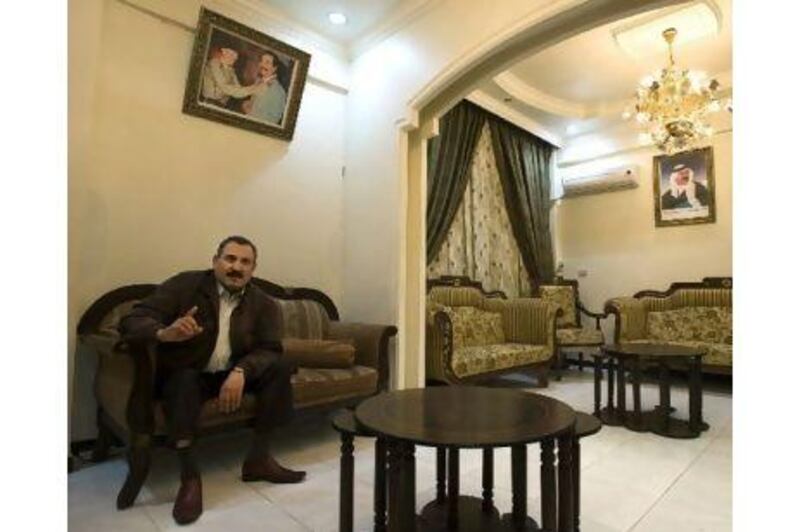DAMASCUS // Splinter groups from Iraq's Baath party have formed a new alliance that supports the democratic political process, renounces violence and calls for Saddam Hussein-era criminals to face trials.
The move towards reconciliation by the five Baathist factions, all exiled in Syria, puts them firmly at odds with the hardline group led by Izzat al Douri, a former aide to Saddam Hussein.
The al Douri wing contains Saddam loyalists and continues to participate in an insurgency that left thousands of Iraqis dead in 2010.
Nationalist and secular in outlook, the Baath party seized control of Iraq in the late 1960s and, under Saddam Hussein, ruled the country until his overthrow by US-led forces in 2003.
It was subsequently banned in Iraq, and remains so, resulting in thousands of Baathists fleeing the country, many seeking refuge in Syria and Jordan.
Since 2007 the party has been divided, splitting into at least seven strands. While the al Douri-led group remains vehemently opposed to the post-2003 political process in Iraq, refuses to recognise the new government and advocates violent resistance to US forces, the other factions have now adopted a softer line.
"Rather than just rejecting everything and refusing to negotiate, we believe it is time to look at the facts as they are on the ground," said Abdul Khaliiq al Shara, head of the Revision and Unification Baathist faction. "The current Iraqi government is the strongest regime in the Middle East and we have to accept that it came to power through the ballot box. It was elected, even if the process was flawed."
Mr al Shara's group was one of the five Baathist splinter organisations that on Tuesday announced the formation of a new moderate Baathist front. The other four factions are: Rebirth, Arabic Renewal, Gathering of Strugglers and the National Liberation Movement.
Another main Baathist splinter group, led by Mohammad Yunis al Ahmed - he is wanted in Iraq for allegedly organising and funding insurgent operations - did not join the coalition, but Mr al Sahara said talks were continuing and that he expected the group would join soon.
"We renounce violence and are not involved in any military action," Mr al Shara said of the new alliance, which retains the Baath party name. "We accept there is a legitimate right to militarily resist occupation but we believe in political resistance not violent resistance.
"We are against terrorism. We are against violence directed at any Iraqi citizens."
The new Baathist alliance is open to negotiations with the Iraqi government aimed at formal reconciliation, Mr al Shara said. He said his own faction had held talks with a delegation representing prime minister Nouri al Maliki in January.
The Baathist alliance's platform is that US forces, due to pull out of Iraq by the end of 2011, should not be asked to stay on, that sectarian provisions in the constitution should be rewritten and that de-Baathifcation policies - including the ban on the party - should be dropped.
That does not mean, however, that Baath party members found guilty of crimes during the Saddam Hussein regime should simply be pardoned, Mr al Shara said.
"We believe matters of innocence or guilt should be determined in court trials and decided by an independent judiciary," he said. "There should not be special courts, or politicised courts."
The talk of reconciliation brought a sharp response from the al Douri wing, which insists it is the only legitimate incarnation of the Iraqi Baath party.
"These groups are led by five men and they only represent themselves, no one else. They have no followers. They are not Baathists and have no authority to speak in the party's name," said Khudeyr al Mushedi, the spokesman for the Iraqi Baath Party, led by Izzat al Douri. "They support the political process and reconciliation, well, the political process and these groups will go to hell. We are the Baath party, no one else has the right to say they are."
There are no reliable figures for how much support the various Baath factions have, with each dismissing the others' claims for mass membership. All the groups are illegal in Iraq, meaning real members are unable to declare themselves as such.
While the al Douri wing remains loyal to the former Iraqi dictator, the five splinter groups are far from uncritical of the Baath party's past.
"One of the things that must be done is an honest review of our history," said Mr al Shara. "As Baathists we have to ask ourselves why we failed, why the party was swallowed by power and why we came to deify Saddam.
"We also need to question our legitimacy. We need to be open and admit that, at the moment, we are all equally illegitimate until we have a direct dialogue with the Iraqi people."





